RAIL TRAVEL AND RETAIL BRANDING, A MATCH MADE IN HEAVEN?
The importance of Rail travel in India
The Indian Railways is the quickest, most efficient and cheapest method of transportation for freight and passengers. Industrialized nations across the world have well-developed railway networks, and India is no different. Covering hundreds of thousands of miles in every direction, the Indian Railways network is even reaching far and otherwise inaccessible corners of the country.
Similar to well-developed railway networks in industrialized nations, metro rail systems in India cover extensive distances, connecting various urban areas and previously inaccessible corners of cities. The economic impact of these metro networks is profound, accelerating the development of industries, commerce, and urban infrastructure.
The success of metro rail projects in India has inspired other cities and countries to consider and implement similar systems to address their own transportation challenges. The transformative impact of metro railway lines in India showcases the immense potential of well-planned and integrated urban transit networks in improving the quality of life in cities.
Additionally, the metro systems in India have emerged as a reliable and convenient mode of transportation. With their well-designed infrastructure, metro networks offer a seamless travel experience to passengers. Clean and spacious compartments, well-maintained facilities, and efficient ventilation systems contribute to the comfort and satisfaction of commuters. The metro systems have successfully addressed the challenges faced by traditional railway services, attracting a wide range of travellers and contributing to the overall improvement of public transportation in India.
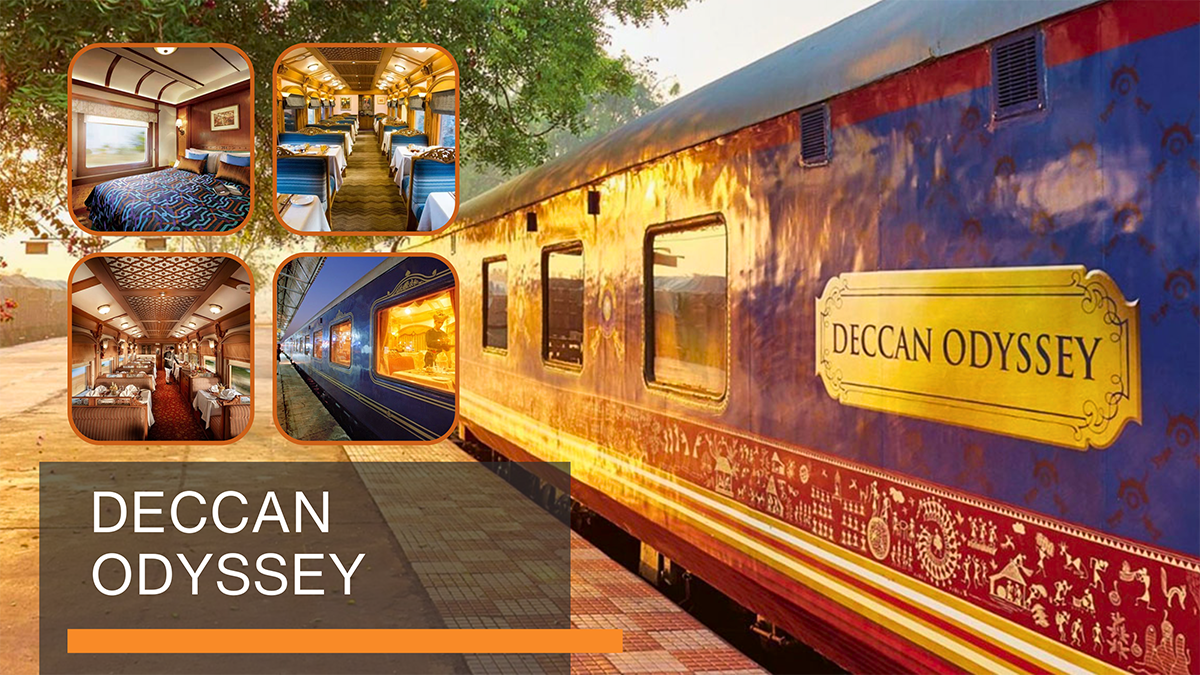
The Railways are ripe for branding & beautification
Rail travel in India is garnering mass appeal by keeping up with the times. Luxury trains like Deccan Odyssey, Maharaja Express, and Palace on Wheels are still categorized among the most sought-after and magnanimous railway ventures known worldwide. The Vistadome project showcasing the breathtaking geography of some of the most pristine locations, turned out to be loved by travel enthusiasts worldwide, while the Vande Bharat Project has redefined how people perceive railways in the country.
In addition to the examples mentioned earlier, the Humsafar Express, Antyodaya Express, and Tejas Express are some examples of trains launched by Indian Railways that feature unique branding and fleet graphics. These trains provide a comfortable and luxurious travel experience to passengers, and their graphics reflect this focus on premium services. The Gatimaan Express is another such train that boasts a sleek and modern design, with graphics that convey speed and efficiency. Apart from trains, the Indian Railways has also initiated projects for railway station beautification, such as the Amrit Bharat station scheme. This project aims to transform railway stations across the country into clean, aesthetically pleasing spaces that reflect local culture and heritage.
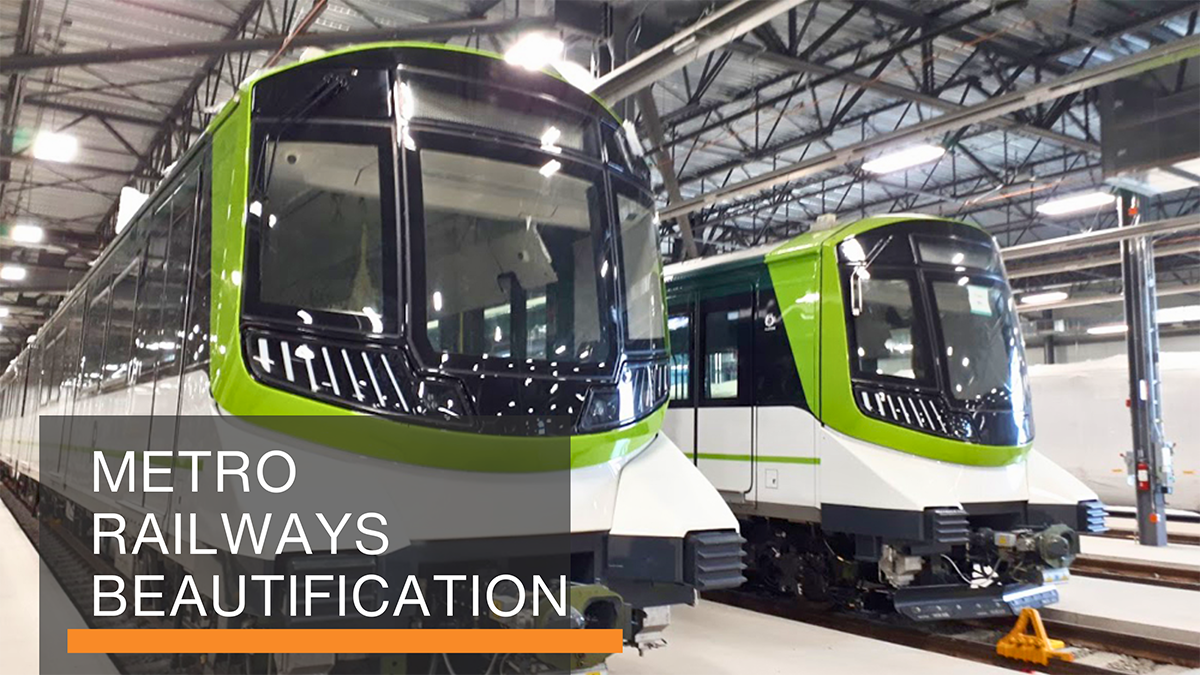
While the examples provided so far highlight the achievements of Indian Railways, it’s important to note that similar beautification efforts have also been undertaken for metro and RRTS (Rapid Rail Transit System) segments. Notable instances include the Agra Kanpur and Kalka-Shimla metro coaches. Globally, companies like AGX have made significant contributions to railway fleet graphics, such as our work for the Sydney Metro and REM (Réseau Express Métropolitain- Montreal) where we brought them to life through our high skill and attention to detail.
These examples showcase the relevance and impact of fleet graphics in creating visually striking and appealing transportation systems.
From a technical standpoint, fleet graphics play a critical role in promoting these train projects and railway station beautification initiatives. The graphics must be designed with careful attention to detail, using high-quality materials and techniques that can withstand the wear and tear of daily use. Additionally, the graphics must be integrated seamlessly into the overall design of the trains or railway stations, enhancing the visual appeal and creating a cohesive brand or a distinctive identity for a government-run transportation system such as the Indian railways.
By leveraging such experiences and global references, Indian Railways and other transit systems can enhance their aesthetics and create visually captivating environments that align with the exceptional services they offer.
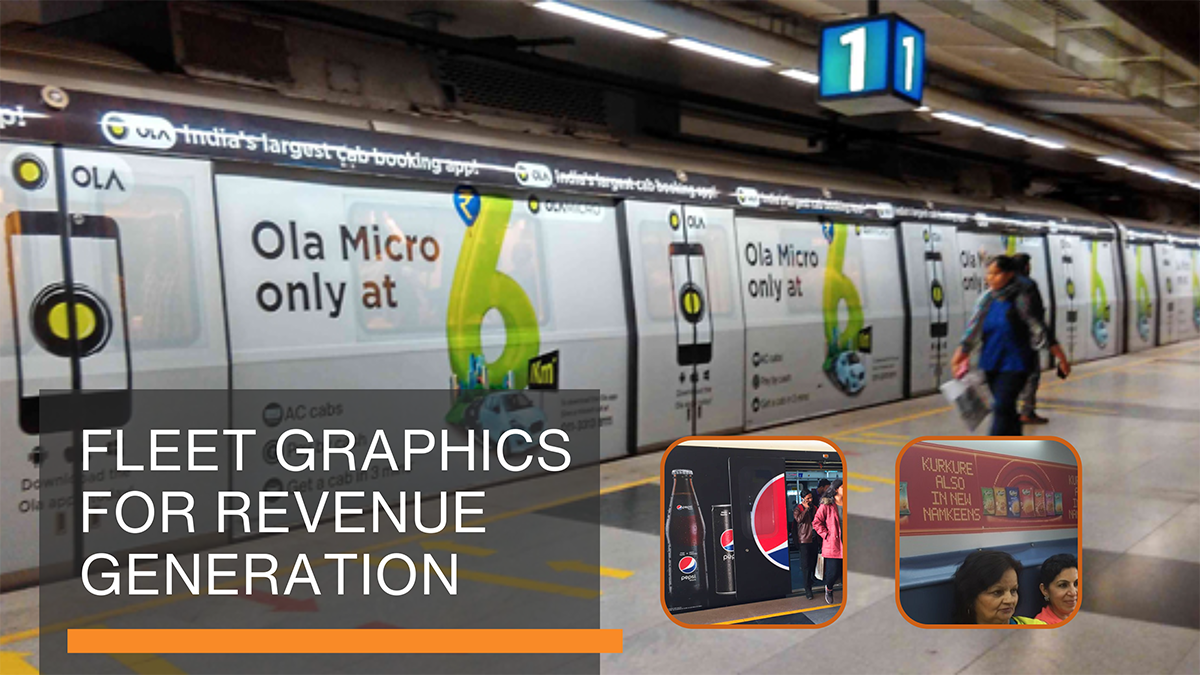
Fleet graphics for revenue generation
Fleet graphics on trains are an effective way to make them more visually appealing to passengers and onlookers. Beyond just beautification, fleet graphics can also serve as a powerful advertising tool as they cut across demography and market segments that connect with various Indian Masses.
This is actually a proven model, as there have been several examples of successful advertising campaigns on trains in India. Here are some examples of the same from the past:
- The Airtel Kurkure Express – In 2012, a train was decorated with the logos of Airtel and Kurkure, two popular Indian brands. The train travelled between two major cities in India, and the campaign was an enormous success, generating significant revenue for the Indian railways.
- Coca-Cola’s Happiness Express – In 2013, Coca-Cola decorated an entire train with its branding and launched a campaign called the Happiness Express. The train travelled across the country, stopping at various cities and towns to host events and distribute free Coca-Cola products. The campaign was an immense success, generating buzz on social media and driving sales for the brand.
- Ola campaign in Delhi Metro– In 2018, Ola, the ride-hailing service, launched an ad campaign on Delhi Metro trains called “Ola Easy Commute.” The campaign involved placing advertisements inside metro trains and at metro stations, promoting Ola as a convenient and comfortable commuting option. The ads showcased the ease of booking rides through the Ola app and highlighted features like AC cars and reliable drivers. The campaign successfully increased brand visibility and attracted new users to the Ola platform.
- OYO Rooms in Gurgaon Rapid Metro- In 2018, OYO Rooms, a leading hospitality chain, ran an ad campaign on Gurgaon Rapid Metro to promote its affordable accommodations. The campaign involved branding metro stations and placing ads inside the metro trains, showcasing the comfortable rooms, convenient booking process, and attractive pricing of OYO Rooms. The campaign targeted both business and leisure travellers, emphasizing the affordability and quality of OYO’s hotel options.
- Zomato in Chennai Metro – In 2020, Zomato, the food delivery platform, launched an ad campaign on Chennai Metro called “Zomato Delights.” The campaign involved placing vibrant and appetizing food images inside metro trains, targeting passengers during their daily commutes. The ads showcased a wide variety of cuisines available for delivery through Zomato, emphasizing convenience and delicious food options. The campaign effectively increased awareness of Zomato’s food delivery services and encouraged metro commuters to order meals through the platform.
Fleet graphics have been a key factor in the success of these ad campaigns. Unlike traditional paint and other heavy installations, graphics, liveries, and decals, offered a more visually appealing and easily recognizable way to decorate the exterior of trains. This allowed brands to create eye-catching designs that are consistent with their identity and targeted audiences optimally. Clearly, fleet graphics can help to improve the overall passenger experience and ensure the long-term sustainability of the transportation system.
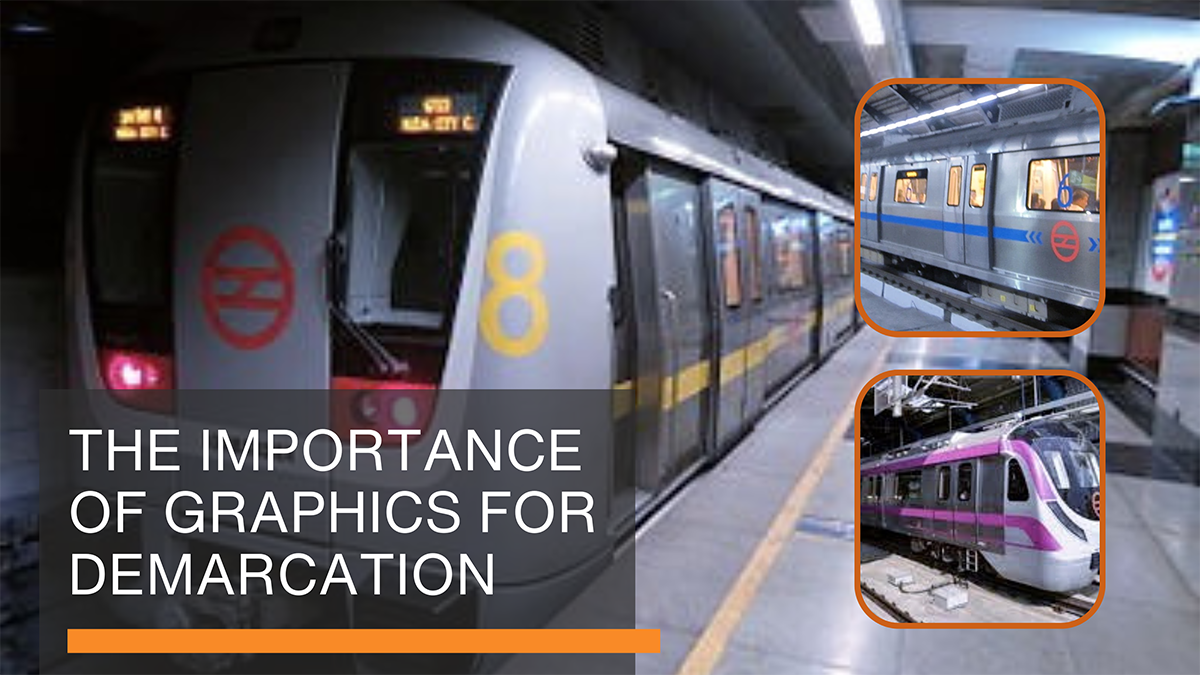
The importance of graphics for demarcation
In modern railways, the use of graphics for demarcation has become increasingly important. Graphics can include maps, routes, warning/caution signs, and other visual aids that help passengers navigate the railways and stay safe while on board. This can be especially helpful for tourists or travellers who need to become more familiar with the area.
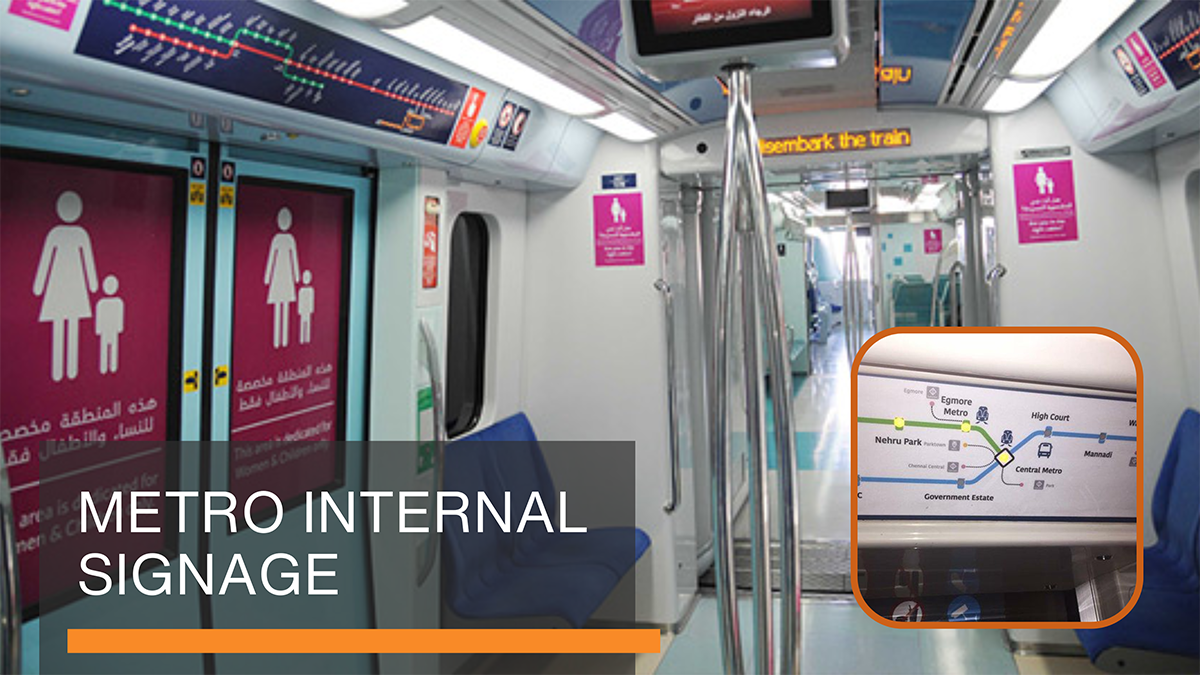
Railways are complex systems that require a high degree of organization and coordination to operate safely and efficiently. Passengers need clear information about the routes, schedules, and safety procedures in order to make informed decisions about their travel. Graphics provide a visual representation of this information.
For example, the maps used by the Chennai and Delhi metro systems provide a clear overview of the various lines and stations, allowing passengers to plan their journey in advance. Similarly, many railways use colour-coded routes and lines to help passengers navigate the system seamlessly.
Graphics provide important information about safety procedures and emergency exits, helping passengers stay safe while on board. By clearly demarcating the various areas of the train, passengers can easily find their way around and avoid potential hazards. By providing clear and concise information, graphics also help enhance the overall customer experience of railway travel. Travellers are more likely to feel satisfied and comfortable when they have all the information they need at their fingertips.
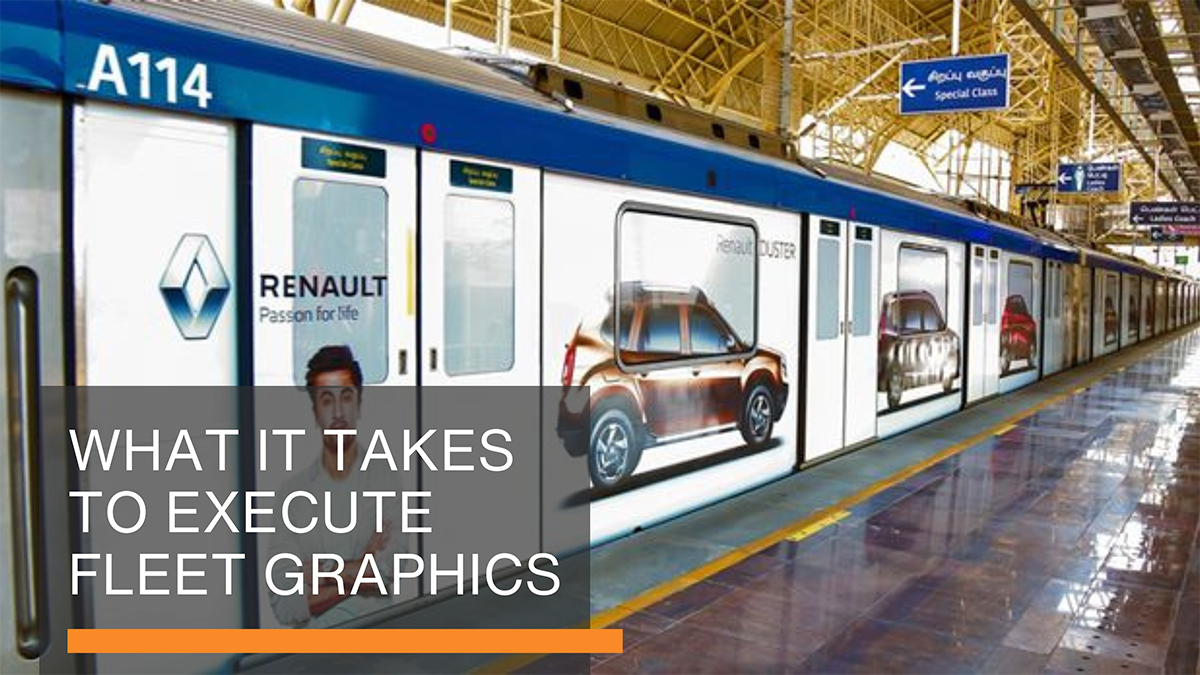
What it takes to execute fleet graphics
Brands must deliberate the logistics of launching an ad campaign on trains, including factors such as train schedules, routes, and passenger demographics. By analyzing these factors and targeting the right audience, companies can maximize the impact of their campaigns and achieve their marketing objectives.
In terms of the technical aspects of fleet graphics, it’s important to note that the design and execution of these campaigns require careful planning and execution. The graphics must be designed in a way that is visually appealing, easily recognizable, and consistent with the brand’s identity.
Rail graphics customization must account for various parameters like Anti-graffiti, cleanability, durability, withstanding temperature changes, and application on various surfaces. These factors not only promote longevity but also prevent unnecessary issues, as trains are subjected to harsh weather and wear and tear.
For example, during our work with Chennai Metro, they wanted to avoid non-environment-friendly inks on their car bodies. They also wanted the graphics to be highly fire retardant (as per European norms), keeping the safety of the passengers as a top priority. Collaborating with 3M India, we at AGX met the stringent requirements of Chennai Metro, which resulted in the first metro rail in India to practice “Green Graphics” for their coach branding.
When we observe the requirements, it becomes very clear that liveries, decals, dynamic displays and signages are the ideal elements of fleet branding, as they can convey a brand’s message and identity in a visually striking and unforgettable way. Compared to traditional paint jobs or other clunky installations, these elements offer several unique advantages:
Flexibility: Graphics, liveries, decals, and signages can be easily removed or updated as needed, making them a cost-effective and flexible option for fleet branding. This is tremendously helpful for brands that need to update their messaging or branding to stay relevant in a competitive market.
Customization: These elements can be customized to suit a brand’s unique requirements and preferences. From colour schemes and fonts to imagery and messaging, every aspect of the design can be tailored to create a cohesive and impactful brand image.
Brand Recognition: The use of graphics, liveries, decals, and signages can help create strong brand recognition, making it easier for consumers to identify and remember a brand. This can lead to increased brand loyalty and customer retention.
Advertising: These elements can also be used for advertising, allowing companies to promote their products and services to a wider audience. For example, train graphics and liveries can help create buzz on social media, generate word-of-mouth marketing, and drive sales for the brand.
Durability: With advancements in technology and materials, graphics, liveries, decals, and signages can now be made to last for many years, even in harsh weather. This makes them a durable and long-lasting option for fleet branding.
Conclusion
Fleet graphics have not only proven to be an effective tool for promoting brands and advertising but also for beautification and demarcation that significantly enhances every aspect of the train travelling experience in the country. Successful campaigns from the past reveal the power of this medium to drive engagement and generate revenue.
Our extensive experience in designing and implementing graphics for buses, trains, and fleets in general, like our work with BEML and Mumbai Metro is what separates us from various other global service providers. We have a proven track record of delivering high-quality results that meet the unique needs of our clients across the globe.
Our team of trained applicators are not just experienced with various decal applications, but proud to also be certified for aircraft graphics applications and have expertly contributed to the beautification of the Sydney Metro and REM (Réseau express métropolitain- Montreal) through our pinpoint precision and unparalleled craftsmanship.
So whether you’re looking to enhance the appearance of your fleet, create a strong visual identity for your brand, or generate revenue through advertising, AGX has the expertise and capabilities to help you achieve your goals. Look no further. Let’s talk.

Comments
Post a Comment